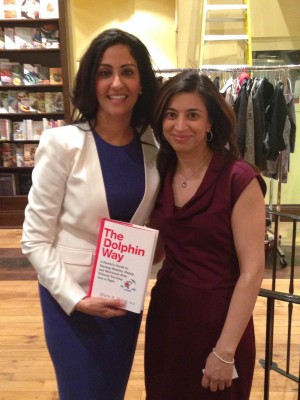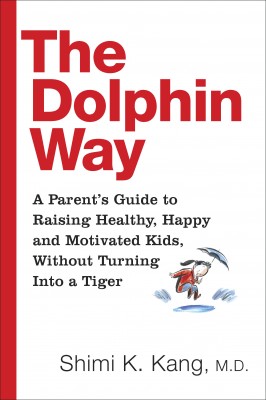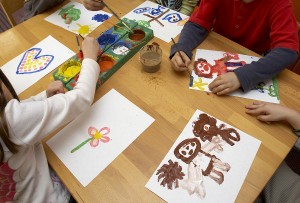By Anjum Choudhry Nayyar 
This year I had some challenges with my son’s school and managing the issues he was experiencing in his montessori classroom. It’s been a tough year.
Like many of you masalamommas out there, when things don’t make sense, sometimes we look to find other resources like parenting books or specialists in parenting who can provide some kind of understanding to what we might be going through.
When I recently met Dr. Shimi Kang at her recent book launch and learned about her book, the Dolphin Way, I just felt a sigh of relief. Suddenly a South Asian mother, parenting author and a psychiatrist (!) was singing the same tune my mom was when I was talking to her about my issues this year with my son.
I have started reading her book and also had a chance to talk one-on-one with her about her work, her insight as a mom and what we as parents may want to know about this journey called, ‘motherhood’.
Here’s a look at what she had to say:

Dr. Shimi Kang, MD
What inspired you to write, “The Dolphin Way”?
I have been a child and youth psychiatrist for over 10 years and have treated the kids of tiger parents for all kids of conditions like stress, anxiety, depression, and substance use over this time frame.
My research at the University was on the science of self-motivation and I would give lectures about how behaviors such as pushing, directing, and hovering sabotage self-motivation and one’s ability to adapt. Yet despite my experience and knowledge, when I became a new mom I felt the immense pressures of today’s parents (for example worrying that my kids needed to get into the right preschool) and it brought out the tiger in me.
My intuition kept telling me my “over-parenting” was wrong but I ignored it because “everyone else was doing it.” Thus, there was a colossal clash between what I scientifically knew as a doctor and researcher, what I valued in my own childhood (free of schedules), and what I was mistakenly doing as a parent. The Dolphin Way was a journey that reconciled all those things for me. Parenting does not have to be so complicated, children are part of nature, and nature cannot be rushed.

What is the ‘Dolphin Way’?
The Dolphin Way is an intuitive approach to parenting that uses role modelling, guiding, and a healthy lifestyle to help children develop internal control and self-motivation. The Dolphin Way has two distinct parts: 1) A balanced authoritative parent-child relationship and 2) a balanced lifestyle, including what many of today’s kids are missing–play and exploration, a sense of community and contribution, and the basics of regular sleep, exercise, and rest.
These are things Dolphins do every day that keep them healthy, happy, and motivated! The Dolphin Way is based on the neuroscience of how the human brain works so if you are a human, it is guaranteed to work!
Who should read this book?
Although The Dolphin Way is called a “parent’s guide,” any human can benefit from it! The metaphor of the overbearing Tiger, permissive Jellyfish, and collaborative Dolphin can be applied to any interpersonal interaction – including the workplace. The neuroscience of how the human brain is naturally motivated is something that anyone can benefit from and I speak at corporations, banks, and businesses about these concepts frequently. In a fast paced, ultra-competitive, and globally connected 21st century world, The Dolphin Way provides us the tools to stay balanced and acquire creativity, collaboration, communication, and critical thinking (CQ) – these will help us adapt and maintain health, happiness, and success in our ever-changing world.
What were you seeing in your practice and in your research that made you realize there’s a real crisis in parenting?
Many of the prevalent parenting styles today describe parents that “take over.” Whether it is the “Amy Chua-like” Tiger parent pushing piano, the Helicopter parent hovering over homework, the Bubble Wrap parent over-protecting, or the Snow-Plough parent shoving all obstacles out of the way – all of these models create an environment of external control and thereby diminish a child’s sense of internal control and self-motivation. Thus, I call ALL these styles “Tiger parents” because they are all authoritarian in nature.
Children of such authoritarian tiger parents are at higher risk of anxiety, depression, entitlement, poor decision making, and difficulty establishing healthy independence. On the other extreme, permissive Jellyfish parents lack rules, discipline, and expectations. Children of Jellyfish parents may turn to peers for guidance and fail to develop self-control. They are at higher risk of poor social skills, risk-taking behaviors, and substance use. Many modern parents flip-flop between Tiger and Jellyfish leaving their child with no consistent message.
How can parents gauge how many activities to put their kids in? What’s healthy, what’s not? What signs to look for?
Each child is different and some children enjoy activities more than others, thus the message of The Dolphin Way is to use your intuition and adapt to each child and a changing child. I encourage parents to “nurture their child’s nature” – choose 1-2 activities that their child has interest in but don’t over-schedule them in them. I see many kids lose their natural interest in an activity because their well-meaning parents “smother” them with tutors, classes, and coaches turning something fun into “work.”
 The key is to make sure the child is enjoying the activity and not tired, sleep deprived, or stressed because of it. At the same time, I caution parents to not become Jellyfish and quit activities their child has collaboratively (meaning the child was involved in the decision) signed up for just because they have a bad day. The Dolphin Way is about balance.
The key is to make sure the child is enjoying the activity and not tired, sleep deprived, or stressed because of it. At the same time, I caution parents to not become Jellyfish and quit activities their child has collaboratively (meaning the child was involved in the decision) signed up for just because they have a bad day. The Dolphin Way is about balance.
What’s your perspective on ‘play time’ and letting kids of a certain age just play? What does that do emotionally and mentally for kids?
For humans and animals, play is directly linked to the development of the brain’s prefrontal cortex – the region of the brain responsible for abstract concepts, monitoring and organizing our own thoughts and feelings, delaying gratification, decision making, and discriminating relevant from irrelevant information. By definition, play is a “purpose-less” activity that stimulates brain boosting freedom not time spent “getting better” at a skill, that is practice. Play makes us comfortable with uncertainty, allows us to take risks, and learn from trial and error.
These are the ingredients for the ability to adapt. Today’s kids are being severely derived of this powerful activity as the average child has lost over 8 hours of free unstructured play/week mostly due to scheduled activities. This is play deprivation and I see it no different in severity to a child’s health as sleep deprivation. Luckily, it is not too late to correct either.
What do you think might account for the perceived achievement gap between kids of different cultural groups (if any)?
 There are Tigers, Dolphins, and Jellyfish in all cultures, and this is supported by science and my own clinical and personal experiences. However, throughout the history of this country, the children of immigrants from various cultures have made huge leaps. But is this because immigrant parents are all Tigers? No way! Many immigrants don’t have the time or money to sign their kids up for multiple activities or hover over their child’s piano practice.
There are Tigers, Dolphins, and Jellyfish in all cultures, and this is supported by science and my own clinical and personal experiences. However, throughout the history of this country, the children of immigrants from various cultures have made huge leaps. But is this because immigrant parents are all Tigers? No way! Many immigrants don’t have the time or money to sign their kids up for multiple activities or hover over their child’s piano practice.
In fact, like my own parents, many immigrants need their children to work part-time, help around the house, look after younger siblings, interpret English, or just figure things out on their own. Practically speaking, immigrant kids are rarely “over-parented” and often grow up in real-life environments with enough time to play, explore, and socially connect and problem solve.
This is what leads children to develop the ability to adapt and gives them the internal drive that can catapult them to success. When I feel overwhelmed and stressed, I often remind myself that I am an educated, financially secure parent of three and my own mom was an uneducated, poor parent of five. So instead of doing more, perhaps I should be doing less.
What is the final piece of advice you can give to parents on kids and homework?
Here is some cool neuroscience that will help everyday parenting decisions. Mother Nature is a parent’s best ally. Humans are naturally motivated towards health, happiness, and progress through the biologic release of the powerful neurochemical dopamine. The human brain’s positive motivation feedback loop works like this: Do something good for your survival > receive positive reward via dopamine pathways > experience well-being > gain the intrinsic motivation to do something good for your survival again. This means that the key to well-being is identifying our intrinsic motivators and nurturing them in our children.
Even though some are very obvious – i.e. we all feel more motivated when we have had some sleep vs being sleep deprived, I still spend a lot of time prescribing sleep to kids and parents alike. Other intrinsic motivators like play, exploration, social bonding (which is different from socializing), and helping others may be less obvious but they are just as effective in bringing us that sense of well-being. Parents must stop overscheduling, overprotecting, and being over-competitive to allow their children the time and space to activate their own intrinsic motivators. Remember the word POD – P = play and exploration, O = others and a sense of community and contribution, and D = downtime – slowing down, rest, and sleep.
These are things Dolphins do every day that keep them healthy, happy, and motivated! For more information on Dr. Shimi Kang and her book visit: drshimikang.com and follow her at @drshimikang on twitter.



There are no comments
Add yours